Podcast: Play in new window | Download (Duration: 25:04 — 17.3MB) | Embed
Subscribe: Apple Podcasts | Spotify | Amazon Music | Android | Pandora | iHeartRadio | JioSaavn | Podchaser | Gaana | Podcast Index | Email | TuneIn | Deezer | Anghami | RSS | More
 Msgr. John Esseff reflects on the Blessed Virgin Mary and her activity in our lives. He helps us to understand the Immaculate Conception.
Msgr. John Esseff reflects on the Blessed Virgin Mary and her activity in our lives. He helps us to understand the Immaculate Conception.
Reading 1 Gn 3:9-15, 20
the LORD God called to the man and asked him, “Where are you?”
He answered, “I heard you in the garden;
but I was afraid, because I was naked,
so I hid myself.”
Then he asked, “Who told you that you were naked?
You have eaten, then,
from the tree of which I had forbidden you to eat!”
The man replied, “The woman whom you put here with me
she gave me fruit from the tree, and so I ate it.”
The LORD God then asked the woman,
“Why did you do such a thing?”
The woman answered, “The serpent tricked me into it, so I ate it.”Then the LORD God said to the serpent:
“Because you have done this, you shall be banned
from all the animals
and from all the wild creatures;
on your belly shall you crawl,
and dirt shall you eat
all the days of your life.
I will put enmity between you and the woman,
and between your offspring and hers;
he will strike at your head,
while you strike at his heel.”The man called his wife Eve,
because she became the mother of all the living.
Reading 2 Eph 1:3-6, 11-12
Brothers and sisters:
Blessed be the God and Father of our Lord Jesus Christ,
who has blessed us in Christ
with every spiritual blessing in the heavens,
as he chose us in him, before the foundation of the world,
to be holy and without blemish before him.
In love he destined us for adoption to himself through Jesus Christ,
in accord with the favor of his will,
for the praise of the glory of his grace
that he granted us in the beloved.
In him we were also chosen,
destined in accord with the purpose of the One
who accomplishes all things according to the intention of his will,
so that we might exist for the praise of his glory,
we who first hoped in Christ.
Gospel Lk 1:26-38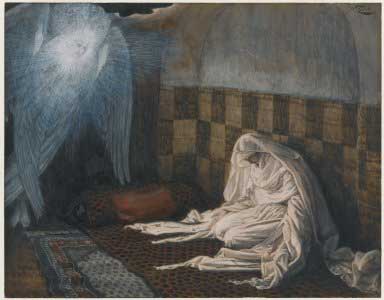
to a town of Galilee called Nazareth,
to a virgin betrothed to a man named Joseph,
of the house of David,
and the virgin’s name was Mary.
And coming to her, he said,
“Hail, full of grace! The Lord is with you.”
But she was greatly troubled at what was said
and pondered what sort of greeting this might be.
Then the angel said to her,
“Do not be afraid, Mary,
for you have found favor with God.
Behold, you will conceive in your womb and bear a son,
and you shall name him Jesus.
He will be great and will be called Son of the Most High,
and the Lord God will give him the throne of David his father,
and he will rule over the house of Jacob forever,
and of his Kingdom there will be no end.”
But Mary said to the angel,
“How can this be,
since I have no relations with a man?”
And the angel said to her in reply,
“The Holy Spirit will come upon you,
and the power of the Most High will overshadow you.
Therefore the child to be born
will be called holy, the Son of God.
And behold, Elizabeth, your relative,
has also conceived a son in her old age,
and this is the sixth month for her who was called barren;
for nothing will be impossible for God.”
Mary said, “Behold, I am the handmaid of the Lord.
May it be done to me according to your word.”
Then the angel departed from her.
Lectionary for Mass for Use in the Dioceses of the United States, second typical edition, Copyright © 2001, 1998, 1997, 1986, 1970 Confraternity of Christian Doctrine;


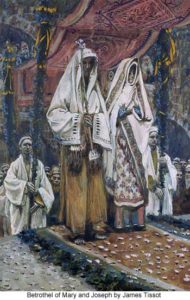
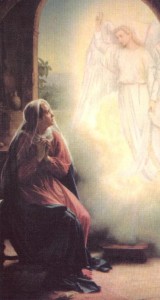
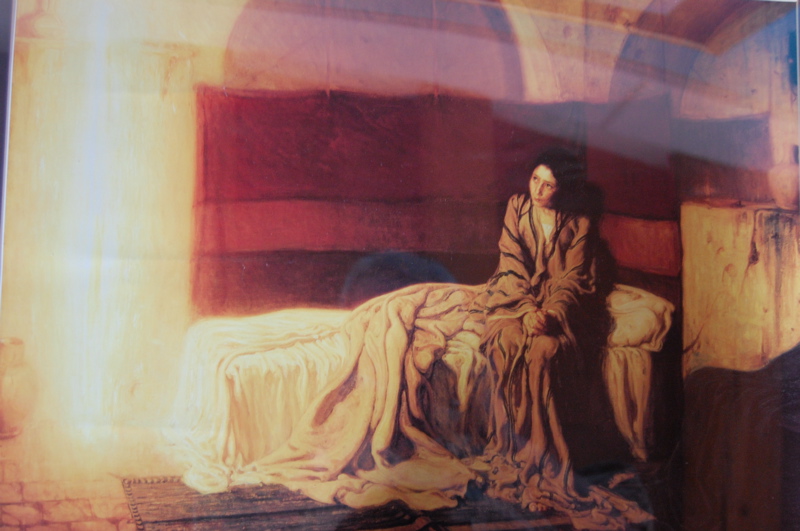
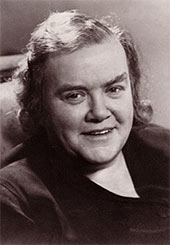

 Against her will, she was married by her father to a young, pagan patrician named Valerian. While everyone sang and danced at their wedding, Cecilia sat apart, saying only the Psalms. Valerian turned out to be a man of great understanding. On their wedding night, she told Valerian, “I have an angel of God watching over me. If you touch me in the way of marriage, he will be angry, and you will suffer. But if you respect my maidenhood, he will love you as he loves me.”
Against her will, she was married by her father to a young, pagan patrician named Valerian. While everyone sang and danced at their wedding, Cecilia sat apart, saying only the Psalms. Valerian turned out to be a man of great understanding. On their wedding night, she told Valerian, “I have an angel of God watching over me. If you touch me in the way of marriage, he will be angry, and you will suffer. But if you respect my maidenhood, he will love you as he loves me.”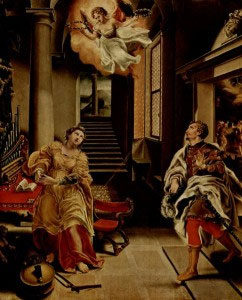 From that time the two young men dedicated themselves to good works. Because of their ardor in burying the bodies of martyred Christians, they were arrested. The prefect Almachius told them that if they would sacrifice to the gods, they could go free. They refused, and Valerian rejoiced when he was handed over to be scourged.
From that time the two young men dedicated themselves to good works. Because of their ardor in burying the bodies of martyred Christians, they were arrested. The prefect Almachius told them that if they would sacrifice to the gods, they could go free. They refused, and Valerian rejoiced when he was handed over to be scourged.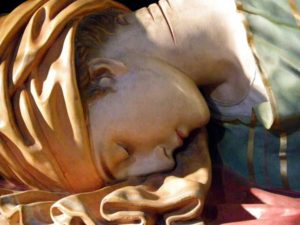 lingered for three days, during which time the Christians thronged to her side, and she formally made over her house to Urban and committed her household to his care.
lingered for three days, during which time the Christians thronged to her side, and she formally made over her house to Urban and committed her household to his care.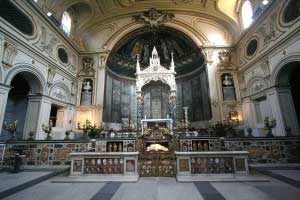
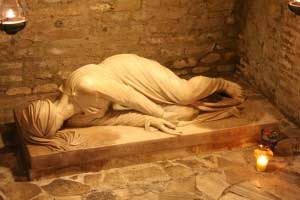 sword. A replica of this statue occupies the original resting place of the saint in the Catacomb of Callixtus. Other artists were allowed to paint pictures of her after her tomb was opened.
sword. A replica of this statue occupies the original resting place of the saint in the Catacomb of Callixtus. Other artists were allowed to paint pictures of her after her tomb was opened.





